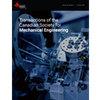Photovoltaic Thermoelectric Cooling System for Off-grid Vaccine Refrigerator: An Experimental Study
IF 1
4区 工程技术
Q4 ENGINEERING, MECHANICAL
Transactions of The Canadian Society for Mechanical Engineering
Pub Date : 2023-08-18
DOI:10.1139/tcsme-2023-0003
引用次数: 1
Abstract
The rapidly rising demand for refrigeration technologies, mainly in refrigeration and air conditioning, medical applications and electronic component cooling, produced much more energy than the requirement. Thermoelectric refrigeration is an innovative way to use additional energy to cool and reserve cooling. In this research, a Photovoltaic-thermoelectric refrigeration system capable of sustaining vaccine storage within the limit of 2 to 8 ℃ has been established by experimentally optimizing its volume and performance. The design specification is to cool the volume using forced convection to the desired temperature range in less than thirty minutes and sustain retained heat for at least the next hour. The experimental research is divided into two stages: the first determines the optimal volume of vaccine storage under different testing conditions using only grid power, and the second analyses storage performance using solar energy through PV integration. The solar direct drive and the solar drive with battery support have been timed, revealing a holding period of 4 hours 46 minutes and 5 hours 29 minutes, respectively. The refrigerator's design criteria, prospective characteristics, and final design are all thoroughly highlighted. Finally, we conclude that this research will likely benefit the modelling and analysis of thermoelectric cooling systems.离网疫苗冰箱光伏热电制冷系统的实验研究
对制冷技术的需求迅速增长,主要是在制冷和空调、医疗应用和电子元件冷却方面,产生的能源远远超过需求。热电制冷是一种利用额外能源进行冷却和储备冷却的创新方式。在本研究中,通过实验优化其体积和性能,建立了一种能够在2至8℃范围内维持疫苗储存的光伏热电制冷系统。设计规范是使用强制对流在不到三十分钟的时间内将体积冷却到所需的温度范围,并至少在接下来的一个小时内保持余热。实验研究分为两个阶段:第一阶段仅使用电网电力确定不同测试条件下疫苗的最佳储存量,第二阶段通过光伏集成分析使用太阳能的储存性能。太阳能直接驱动和具有电池支撑的太阳能驱动已经被计时,显示出保持时间分别为4小时46分钟和5小时29分钟。冰箱的设计标准、预期特征和最终设计都得到了充分的强调。最后,我们得出结论,这项研究可能有利于热电冷却系统的建模和分析。
本文章由计算机程序翻译,如有差异,请以英文原文为准。
求助全文
约1分钟内获得全文
求助全文
来源期刊
CiteScore
2.30
自引率
0.00%
发文量
53
审稿时长
5 months
期刊介绍:
Published since 1972, Transactions of the Canadian Society for Mechanical Engineering is a quarterly journal that publishes comprehensive research articles and notes in the broad field of mechanical engineering. New advances in energy systems, biomechanics, engineering analysis and design, environmental engineering, materials technology, advanced manufacturing, mechatronics, MEMS, nanotechnology, thermo-fluids engineering, and transportation systems are featured.

 求助内容:
求助内容: 应助结果提醒方式:
应助结果提醒方式:


